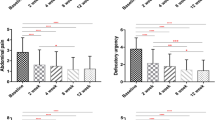Abstract
Background
The antibiotic rifaximin is used to treat non-constipated irritable bowel syndrome (IBS). Methane production is associated with constipation and its severity in constipation-predominant IBS (C-IBS). A previous retrospective study suggested that rifaximin and neomycin was superior to neomycin alone in improving symptoms in methane-positive subjects.
Aims
To determine the effectiveness of neomycin alone or with rifaximin in improving symptoms in methane-positive C-IBS subjects.
Methods
A double-blind, randomized, placebo-controlled trial was performed from 2010 to 2013 at three tertiary care centers. Subjects aged 18–65 with C-IBS (Rome II criteria) and breath methane (>3 ppm) meeting the inclusion and exclusion criteria were recruited. Subjects completed a baseline symptom questionnaire rating the severity of abdominal and bowel symptoms on a visual analog scale and were randomized to receive neomycin and placebo or neomycin and rifaximin for 14 days. Symptom severity was assessed by weekly questionnaire for 2 weeks of therapy and 4 additional weeks of follow-up.
Results
Thirty-one subjects (16 neomycin and placebo, 15 neomycin and rifaximin) were included in the intention-to-treat analysis. Constipation severity was significantly lower in the neomycin and rifaximin group (28.6 ± 30.8) compared to neomycin alone (61.2 ± 24.1) (P = 0.0042), with greater improvement in constipation (P = 0.007), straining (P = 0.017) and bloating (P = 0.020), but not abdominal pain. In the neomycin and rifaximin group, subjects with methane <3 ppm after treatment reported significantly lower constipation severity (30.5 ± 21.8) than subjects with persistent methane (67.2 ± 32.1) (P = 0.020).
Conclusions
Rifaximin plus neomycin is superior to neomycin alone in improving multiple C-IBS symptoms. This effect is predicted by a reduction in breath methane.





Similar content being viewed by others
References
Sandler RS, Everhart JE, Donowitz M, et al. The burden of selected digestive diseases in the Unites States. Gastroenterology. 2002;122:1500–1511.
Thompson WG, Longstreth GF, Drossman DA, Heaton KW, Irvine EJ, Muller-Lissner SA. Functional bowel disorders and functional abdominal pain. Gut. 1999;45:II43–II47.
Halvorson HA, Schlett CD, Riddle MS. Post-infectious irritable bowel syndrome: a meta-analysis. Am J Gastroenterol. 2006;101:1894–1899.
Thabane M, Kottachchi DT, Marshall JK. Systematic review and meta-analysis: the incidence and prognosis of post-infectious irritable bowel syndrome. Aliment Pharmacol Ther. 2007;26:535–544.
Shah ED, Basseri RJ, Chong K, et al. Abnormal breath testing in IBS: a meta-analysis. Dig Dis Sci. 2010;55:2441–2449.
Posserud I, Stotzer PO, Björnsson ES, et al. Small intestinal bacterial overgrowth in patients with irritable bowel syndrome. Gut. 2007;56:802–808.
Pyleris E, Giamarellos-Bourboulis EJ, Tzivras D, et al. The prevalence of overgrowth by aerobic bacteria in the small intestine by small bowel culture: relationship with irritable bowel syndrome. Dig Dis Sci. 2012;57:1321–1329.
Chang C, Funari V, Giamarellos-Bourboulis EJ, et al. Deep sequencing reveals that the microbiome of the human duodenum is unique and unrelated to stool bacterial profiling. Gastroenterology. 2013;144:S908.
Pimentel M, Lembo A, Chey WD, et al. Rifaximin therapy for the treatment of irritable bowel syndrome without constipation. N Engl J Med. 2011;364:22–32.
Kunkel D, Basseri RJ, Makhani MD, et al. Methane on breath test is associated with constipation: a systematic review and meta-analysis. Dig Dis Sci. 2011;56:1612–1618.
Attaluri A, Jackson M, Valestin J, et al. Methanogenic flora is associated with altered colonic transit but not stool characteristics in constipation without IBS. Am J Gastroenterol. 2010;105:1407–1411.
Pimentel M, Lin HC, Enayati P, et al. Methane, a gas produced by enteric bacteria, slows intestinal transit, an augments small intestinal contractile activity. Am J Physiol. 2006;290:G1089–G1095.
Chatterjee S, Park S, Low K, et al. The degree of methane production in IBS correlates with the severity of constipation. Am J Gastroenterol. 2007;102:837–841.
Pimentel M, Chatterjee S, Chow EJ, et al. Neomycin improves constipation predominant irritable bowel syndrome in a fashion that is dependent on the presence of methane gas: sub-analysis of a double blind randomized controlled study. Dig Dis Sci. 2006;51:1297–1301.
Low K, Hwang L, Hua J, et al. A combination of rifaximin and neomycin is most effective in treating irritable bowel syndrome patients with methane on lactulose breath test. J Clin Gastroenterol. 2010;44:547–550.
Kim G, Deepinder F, Morales W, et al. Methanobrevibacter smithii is the predominant methanogen in patients with constipation predominant IBS and methane on breath. Dig Dis Sci. 2012;57:3213–3218.
Menees SB, Maneerattannaporn M, Kim HM, et al. The effect and safety of rifaximin for the irritable bowel syndrome: a systematic review and meta-analysis. Am J Gastroenterol. 2012;107:28–35.
Acknowledgments
This study was supported by funding from Salix Pharmaceuticals. Salix provided the placebo and rifaximin for this study and was responsible for the randomization of study subjects and blinding of investigators to the study drugs during the conduct of the study, but were not involved in any other aspect of the study including implementation, recruitment, analysis or construction of the manuscript.
Conflict of interest
Dr. Pimentel has received grants from and is a consultant for Salix Pharmaceuticals, with whom Cedars-Sinai has a licensing agreement. The remaining authors have nothing to disclose. This study was supported by funding from Salix Pharmaceuticals.
Author information
Authors and Affiliations
Corresponding author
Additional information
Trial Registration: The study was registered with clinicaltrials.gov (NCT00945334).
Rights and permissions
About this article
Cite this article
Pimentel, M., Chang, C., Chua, K.S. et al. Antibiotic Treatment of Constipation-Predominant Irritable Bowel Syndrome. Dig Dis Sci 59, 1278–1285 (2014). https://doi.org/10.1007/s10620-014-3157-8
Received:
Accepted:
Published:
Issue Date:
DOI: https://doi.org/10.1007/s10620-014-3157-8




